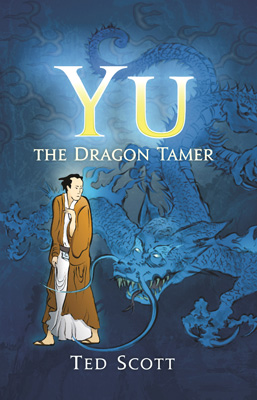Yu The Dragon Tamer

Yu The Dragon Tamer
This is a book about a courageous man, Yu, who suffers from mental illness. It tells of his personal and spiritual development and the growing intrusion of the manifestation of mental illness in his life. It documents how his own courage and the guidance of others help him reconstruct his world view to something more functional.
Author Ted Scott says he "wanted to show the difficulties we encounter when we view the world in a dysfunctional way. I particularly wanted to show that those who are so inflicted are human beings like the rest of us and often imbued with admirable qualities. If it helps other folk view such sufferers more humanely and reinforce that such conditions are largely a result of our genetics and early socialisation, matters over which we had no choice, I would be satisfied that my story was worthwhile telling."
Following a long and successful career in Queensland's electricity industry, and recognised by the Australian Financial Review's Boss magazine as one of the country's top business leaders, author Ted Scott is now an eminent executive coach and speaker on management practice. Buddhist writings and practice have provided models for his coaching methodology and the inspiration behind the parables that make up Yu, the Dragon Tamer. This is the second book in the "Augustus" series - the previous title was Augustus Finds Serenity.
www.tedscott.aampersanda.com
Yu The Dragon Tamer
A&A Book Publishing
Author: Ted Scott
ISBN: 9780980739954
Price: $24.99
Interview with Ted Scott
Question: Why did you decide to write a book about mental illness?
Ted Scott: I have over many years pursued understanding in two primary fields, viz. human behaviour and spirituality. My growing understanding about human behaviour has led me to believe that on a moment to moment basis we have little control over our behaviours. Human behaviour is driven by our socialisation working off a genetic platform that disposes us to behave in ways that are largely beyond our control in the short term. These factors contribute to the fashioning of a "world-view". We are greatly influenced by this phenomenon. How we view the world impacts hugely on our behaviours. I have tried to demonstrate this in Yu, The Dragon Tamer.
If we examine mental illness we soon come to an awareness how arbitrary that diagnosis is. Many of us display behaviour that is different to our peers, but we are not labelled "mentally ill." Some minor aberrant behaviour is seen as quaint, amusing or mildly eccentric. Who can tell when we ought to change the diagnosis to mental illness?
I am largely in favour of recent efforts to destigmatise mental illness. In my book I have tried to show that someone (in this case Yu) can have many admirable qualities but still suffer from dysfunctional behaviours in some arenas of life because of an inappropriate world-view.
Whilst we think that the behaviours of those we label as "mentally ill" are strange and aberrant, my good friend and mentor, clinical psychologist Dr Phil Harker, has pointed out these behaviours have a purpose. The purpose is to shield us from unwelcome intrusions of the real world which threaten our self-concept. He has taught me that to understand human behaviour it is more informative to understand what is it's purpose, what benefits if confers on the afflicted, rather than to ask what has caused it. Behaviours are repeated when there is a pay-off, when they lead to some benefit to the perpetrator.
The problem we have to confront however, is that in our efforts to destigmatise mental illness we have left the sufferers in a passive state. We have encouraged them to believe that mental illness is a medical condition and that if we just took our medicine and rested, allowing the drugs to do their work, all would be well. Despite the massive progress in psychotropic drugs there are many mental illnesses where the only way out for the afflicted is to change their behaviour. This is not easy. I have tried to underline this dilemma for Yu and I wanted to emphasise the courage required to take such a stand.
I should say that there are some conditions, for example when people have experienced physical damage to the brain, have experienced diminished cognitive capability through the use of drugs or have severe genetically derived malfunction, the ameliorating processes I have laid out in my book would not be effective.
But to summarise, I would like to encourage some tolerance for people with mental afflictions and reinforce that, despite these handicaps, such people can still have many admirable characteristics.
Question: What inspired you to write Yu The Dragon Tamer?
Ted Scott: My principal inspiration, again, came from my friend Dr Phil Harker. In a discussion about aberrant behaviour he said to me that it was more informative not to ask what caused the behaviour but what was its purpose? As I intimated above dysfunctional behaviour is usually persisted with because it confers upon the perpetrator a benefit. This is not a conscious process. We learn these behaviours early, usually from significant others. We learn to get our way or accommodate our strange concepts of the world by behaviours that help us to manipulate others or in some way keep an inimical world at bay.
Yu enters the story as a self-obsessed young man. Through the teachings of his master, Takygulpa Rinpoche he soon enough learns humility and detachment. He is brave and altruistic, yet despite this he suffers auditory and visual hallucinations. He is torn between his personal need to pursue his spiritual development and to meet the expectations of his father. It is this conflict that finally thrusts him into a delusional world. I wanted to show that no matter how supportive his friends Lin Po and Augustus were, his final salvation only came when he was prepared to face his demons. All along the way Yu has shown courage. But in the end it was only his mental courage that enables him to regain his sense of composure. Exemplifying the approach I mentioned above, his redemption does not come from a passive disposition but from an active confrontation with his demon viz. the dragon who has imprisoned him.
Question: What interests you about the 'new age' genre?
Ted Scott: To tell the truth I am not interested in the New Age genre! I believe much of the New Age material is fanciful and without confirming evidence or intellectual rigour. My work has been informed by comprehensive reading in related areas (both in spirituality and psychology) and extensive consultation with psychologists. I am not offering any quick and easy solutions. Changing human behaviour is incredibly difficult. There are no "silver bullets"! I hope that I have written an entertaining story that does not demean the efforts and the struggle of someone afflicted by a moderate mental condition to come to grips with the world. Yu's final recovery results from no easy three stage process or magical transformation but from his own courageous efforts to reengage more productively with the world.
I am sorry if this sounds pompous, but quite often New Age material gives people false hope.
Question: Can we expect another book in the Augustus series?
Ted Scott: I certainly hope so! I have already largely completed two manuscripts with Augustus as the central character. In the first one he has to deal with another person's depression - in the other he confronts two societies, one Muslim and the other Christian - and seeks to mediate a conflict that has developed as a result of their religious differences. Poor Augustus! He doesn't get any easy gigs, does he?
MORE





